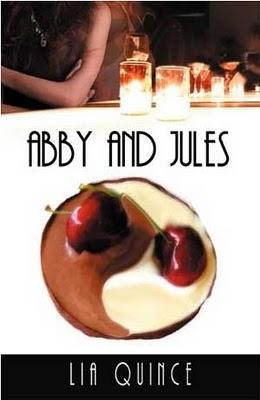Abby and Jules

Early in Lia Quince’s novel Abby and Jules, adolescent protagonist Abby steps onto a street in Beijing on her own for the first time. She is conflicted, carrying both the naïve adolescent confidence that she can survive alone in any city and the awareness that she is a white woman in China. The swirl of teenage emotions is thoughtfully captured.
Unfortunately, this one moment is the high point of the novel. Abby and Jules is a poorly conceived and poorly executed work. Some of the difficulties lie in the prose, such as when a masturbation scene refers to “the spot of exquisite pleasure.” Some problems lie in poor narrative pacing; some lie in character inconsistencies, as when Abby, described as an “eco-chick” on every other page, is driven into an environmentalist tailspin when asked what to order at a coffee bar (pesticides in the rainforest, disposable cups, processed and sugary syrup), but fears receiving a “recycled” engagement ring without even a cursory nod to the politics of the diamond trade. Literary and cultural references are shoehorned awkwardly into the prose, which leads to forced comparisons between Quince’s characters and more established historical or literary figures that make little sense and do nothing to enhance the plot.
Some of the worst aspects of the novel lie in the skewed reasoning on which the plot turns: when Abby learns about her father's involvement in an illicit sexual relationship, she endeavors to understand her father. Even as her understanding ostensibly becomes more nuanced, she holds onto the view that he is not to blame. Still other challenges lie in the blatant lack of editing of the manuscript. The problem reveals itself most hilariously when, in a novel about Chinese-American relations with no sense of irony, Abby considers a recent one night stand and wonders: “Was she too much out of character as the wonton [sic] whore last night as the she [sic] emulated the bad girl Julie Yang?” This is only the most humorous example, but several blatant typos appear on nearly every page, giving the piece an air of rushed neglect.